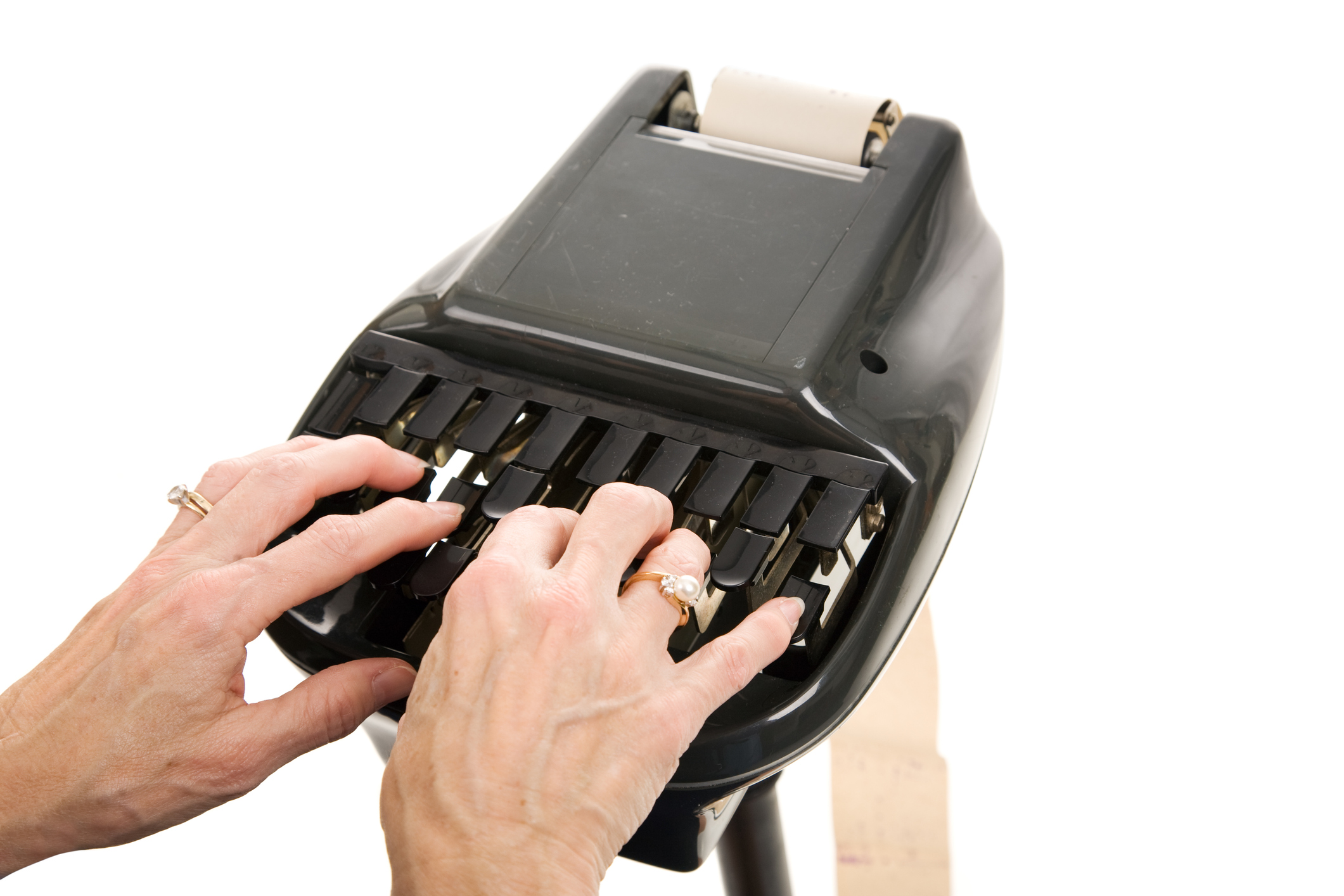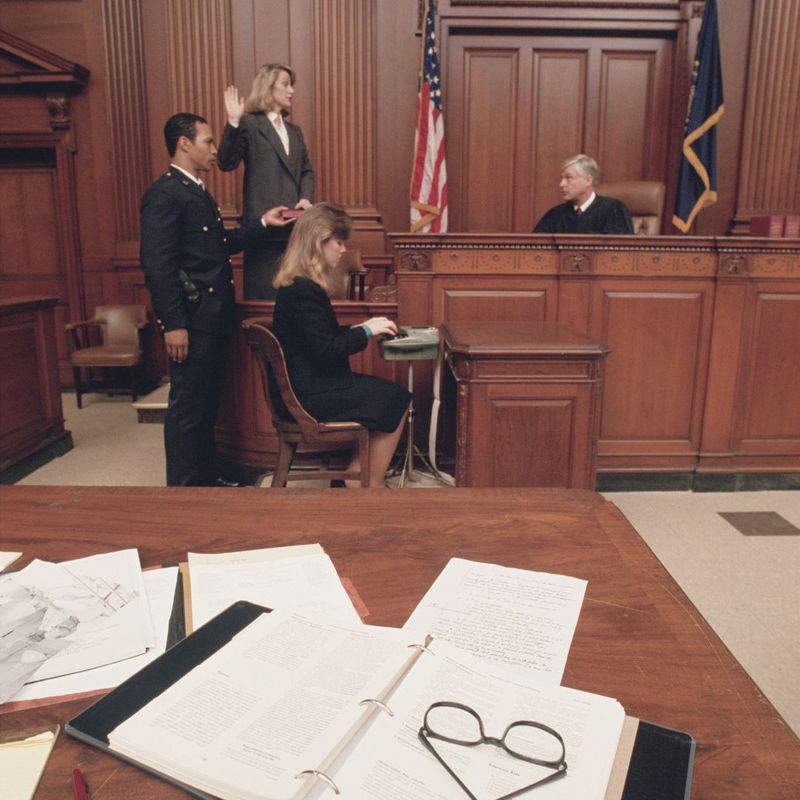Court Typist Certification: What You Have to Do to Get Started
Court Typist Certification: What You Have to Do to Get Started
Blog Article
Checking Out the Day-to-Day Tasks of a Court Typist in the Judicial System
As you navigate the complex world of the judicial system, you may find yourself interested about the function of a court typist. This position is more than simply inputting; it involves recording every word spoken during process with precision. Every day presents special challenges and obligations that are necessary for keeping the integrity of legal records. Understanding what a court typist does can expose understandings into the broader operations of justice. What does it require to succeed in this role?
Introduction of the Court Typist Duty
As you step into the function of a court typist, you'll find it is necessary to recognize the vital obligations included. You'll work as a vital web link in the judicial process, guaranteeing that all talked words during court proceedings are accurately recorded and documented. Your job supports the integrity of the lawful system, making your attention to detail imperative.You'll operate specific transcription tools, transforming audio recordings right into created transcripts. Knowing with legal terms and court procedures is key, as you'll usually experience complicated language and jargon.You'll likewise need to keep confidentiality and take care of delicate details with care. Your duty needs you to work successfully under stress, often with limited target dates, while continuing to be concentrated on producing clear, accurate transcripts. As a court typist, you play a crucial duty in maintaining the authorities record of court proceedings, contributing substantially to the total performance of the judiciary.

Secret Responsibilities of a Court Typist
While you'll frequently be concentrated on catching spoken words throughout court proceedings, your key responsibilities as a court typist expand far past transcription. You'll prepare and preserve exact records of court activities, guaranteeing they reflect every detail of the process. You'll likewise layout papers, such as legal briefs and summons, sticking to strict standards and deadlines.In addition, you'll take care of and arrange situation documents, making it much easier for lawyers and judges to accessibility essential details rapidly. You're anticipated to check and edit records for quality and accuracy, which is important for the honesty of lawful proceedings.Moreover, you'll work carefully with judges, staffs, and attorneys, maintaining open communication to resolve any inconsistencies or demands. Your duty is crucial in ensuring that the judicial procedure runs smoothly, offering a trusted written account of what transpires in the court.
Crucial Skills for Court Typists
As a court typist, you require to understand both typing speed and accuracy to stay up to date with the demands of the courtroom. Experience with lawful terms is additionally vital, as it guarantees you accurately capture the procedures. These abilities not just boost your efficiency yet likewise add to the total efficiency of the legal process.
Typing Speed and Precision
Keying in rate and precision are vital skills that every court typist need to understand to guarantee the integrity and effectiveness of lawful documents. You require to kind swiftly yet thoroughly, as even minor mistakes can bring about considerable misconceptions in lawful contexts. A high inputting rate enables you to maintain up with busy court proceedings, guaranteeing that every word is caught properly. Exercising routinely can help you boost your speed, while concentrating on precision helps in reducing blunders. Using tools like dictation software or message expanders can additionally enhance your effectiveness. Keep in mind, your role is important in maintaining accurate records, so sharpening these skills not just advantages you however also sustains the entire judicial procedure.
Legal Terms Efficiency
Mastering legal terms is essential for court typists to ensure precise and reliable documents. You need to familiarize yourself with different legal expressions, jargon, and ideas frequently used in court process. This knowledge aids you transcribe recordings and draft files with accuracy. When you comprehend terms like "complainant," "accused," and "subpoena," you'll lower the possibilities of mistakes that might compromise lawful proceedings.Additionally, exceling in legal terms boosts your self-confidence while functioning together with courts, attorneys, and various other lawful experts. You'll locate it much easier to follow discussions and properly capture the essence of what's being claimed. court typist. Continuous knowing and practice will enhance your abilities, making you a valuable possession in the judicial system
Devices and Innovation Made Use Of by Court Typists
As a court typist, you depend on different devices and modern technology to do your responsibilities effectively. You'll require essential inputting tools, straightforward software program applications, and audio transcription devices to keep pace with the demands of your task. Allow's discover exactly how each of these parts plays an essential function in your everyday tasks.
Necessary Keying Equipment
While court typists depend heavily on their skills, the appropriate tools is important for effectiveness and precision. To start with, a top notch key-board is essential for specific and rapid keying, permitting you to maintain rate with courtroom proceedings. Ergonomic designs can help prevent pressure throughout lengthy sessions. A reputable computer with sufficient processing power guarantees smooth operation, specifically when dealing with huge files (court typist). You'll additionally require an excellent printer for creating clear copies of transcripts. Noise-canceling headphones can be beneficial throughout recordings, aiding you concentrate on audio clearness. In addition, a comfy chair and a well-organized work area promote efficiency. With the right equipment, you can boost your inputting capabilities and sustain the judicial process efficiently
Software Application Applications Utilized
To successfully transcribe court proceedings, you'll count on a variety of specialized software program applications created for accuracy and rate. These programs typically include word handling software application, which assists you layout files quickly and appropriately. You'll look at more info also make use of legal-specific software application that helps in taking care of case files and keeping documents, ensuring you can easily access important information.Another important device is real-time transcription software, allowing you to produce transcripts as the procedures unravel. In addition, you might use document administration systems to organize and recover documents easily. With these applications, you'll improve your performance and maintain the high requirements called for in the judicial system, enabling you to concentrate on your typing skills and the job at hand.

Sound Transcription Tools
Court typists usually count on a variety of audio transcription devices to boost the precision of their work. These devices help you transform talked words into written message efficiently. You may use software program like Dragon NaturallySpeaking or Otter.ai, which offer voice acknowledgment capabilities, permitting quick transcription. In addition, audio playback devices allow you to pay attention to recordings consistently, guaranteeing you record every detail appropriately. Some court typists also make use of foot pedals, letting you manage audio playback hands-free while you kind. This combination of innovation not just speeds up the transcription procedure but likewise decreases errors. Familiarizing on your own with these tools can substantially improve your efficiency and the top quality of your transcriptions in the fast-paced judicial atmosphere.
Difficulties Encountered by Court Typists
Several might view the function of a court typist as uncomplicated, you'll rapidly find that it comes with a special collection of obstacles. One significant difficulty is the rapid pace of court procedures. You'll require to stay on par with fast discussions, which can be frightening, specifically when several speakers are involved. Additionally, the legal jargon used in court can be unknown and complicated, needing you to frequently find out and adapt.Another obstacle is the stress of limited due dates. You often have to generate records promptly, which can bring about stress and anxiety and possible errors. Keeping emphasis for long durations is essential, as even a momentary lapse can impact your work.Lastly, taking care of private information implies you need to always focus on safety and discretion, including one more layer of responsibility to your function. Balancing these obstacles ends up being essential for any person in the setting of a court typist.
The Importance of Precision and Focus to Detail
Precision and interest to information are vital for court typists, as even small mistakes can result in substantial misunderstandings in lawful procedures. You're liable for transcribing court hearings, lawful files, and various other essential information, where every word directory counts. A straightforward typo or misplaced spelling could alter the definition of a statement, possibly influencing the outcome of a case.When you concentrate on precision, you help keep the integrity of the judicial system. Your meticulous job sustains lawyers, courts, and customers by supplying clear and accurate documents. Attention to detail additionally reduces the danger of costly hold-ups and assurances that all events involved have access to trustworthy documents.
Job Path and Opportunities for Court Typists
Mastering accuracy and interest to information not just boosts your current role but likewise opens up doors to different profession paths for court typists. As you acquire experience, you may consider advancing to settings such as legal secretary or management aide in law office, where your skills in transcription and file monitoring will certainly be invaluable.You can also check out chances in court coverage, which usually calls for additional training but offers a chance to engage even more straight with court room proceedings.If you appreciate the management side, placements in situation monitoring or legal research study might be a wonderful fit.With better education and learning, you could also come to be a legal assistant, helping attorneys with case preparation.Networking with legal specialists can help you reveal surprise opportunities.Ultimately, your foundation as a court typist furnishes you with skills that are commonly relevant throughout the legal landscape, leading the way for a meeting profession.
Regularly Asked Questions

What Qualifications Are Needed to Become a Court Typist?
To become a court typist, you'll require solid keying abilities, knowledge of lawful terms, and interest to information. A secondary school diploma is commonly needed, and accreditations in transcription can improve your qualifications.
Just how Does a Court Typist Deal With Confidential Info?
You deal with useful source private info by adhering to rigorous protocols, utilizing safe systems, and maintaining discernment. You're educated to acknowledge sensitive data and guarantee it's stored and shared just with licensed workers, safeguarding the integrity of the information.
What Is the Normal Workplace for Court Typists?
You'll commonly locate court typists in a formal office setting, usually bordered by attorneys. The environment's generally silent, focused, and structured, allowing you to focus on transcribing and taking care of sensitive documents successfully.
Are Court Typists Required to Take Dictation During Trials?
Yes, court typists usually take dictation during tests. You'll need to pay attention thoroughly, recording lawful procedures properly and efficiently. Your emphasis and rate will ensure that every information is captured for authorities records.
Just How Do Court Typists Manage Due Dates Throughout Busy Periods?
During hectic durations, you focus on tasks by arranging your work and using effective keying techniques. You set realistic target dates, communicate with colleagues, and remain concentrated to guarantee all files are finished properly and on schedule. While you'll frequently be focused on recording talked words throughout court proceedings, your essential duties as a court typist extend much past transcription. Typing rate and precision are important skills that every court typist need to understand to guarantee the honesty and efficiency of legal documentation. Grasping legal terminology is necessary for court typists to assure efficient and accurate documentation. Accuracy and attention to detail are important for court typists, as even small mistakes can lead to significant misunderstandings in legal proceedings. court typist. To become a court typist, you'll require solid keying abilities, expertise of lawful terms, and interest to detail
Report this page